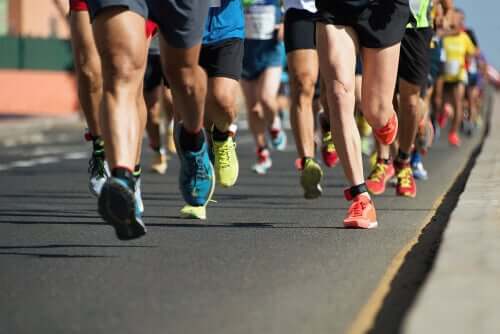The Challenges of Running a Marathon


Written and verified by the psychologist Marcelo R. Ceberio
Marathons are the ultimate running competition. They’re a real challenge for the body, the skeletal and muscle structures, and the cardio-respiratory system. And, at the same time, they’re also a challenge for the mind. A lot of what running a marathon involves unifies the brain and our emotions with the training itself.
Emotions, cognitive images, actions, and neurotransmitters in an absolute synergy are awakened in the scene of the marathon runner, where each race is a personal challenge and provides feedback for the next competitions.
Ritualism in preparation
After a marathon, there are still fossil remains–remains that the sweepers haven’t managed to clean up… Everything from crushed water bottles to hydration gels glistening in the sun and brochures from other races…
For those who run long distances, it’s not common to compete many times during the year. There aren’t many marathons marking distances of 42, 30, or 21 km on annual race calendars. That’s because human physiology doesn’t allow repeated efforts without considerable time for recovery after running a marathon.
The infrequency of marathon races keeps them from becoming routine and that the event takes on a certain adrenaline appeal.
At the same time, for the amateur athlete, marathons consist of three moments: The week before, the week during the race, and the week after the competition.

This entire week consists of certain ritualism and “magical” customs that bring you good luck, even clairvoyance. Also, there’s a certain constant adrenaline charge (and the elevation of cortisol levels). There’s a certain muscular tension that doesn’t allow runners to rest in a relaxed manner. And this sensation only grows as the day approaches.
The struggle to rest before running a marathon
For this reason, it’s important to take as much advantage as possible of sleep two days before running a marathon. That is, if the marathon is on Sunday, then you need to sleep well on Friday, because Saturday is a day of tension. The symptoms of that tension don’t usually appear during the day. Rather, they appear in a burst at night when you’re trying to fall asleep. In the same way, you’re likely to wake up before the alarm clock goes off.
The morning of…
Two hours before the race, the long-distance runner’s ritual begins to unfold. You know that the help of solid vaseline or other elements is miraculous and that there are three key places. Everything that seems banal or insignificant can become torturesome along after a certain number of kilometers.
The next step is to put on a runner’s main equipment: Your running shoes. Of course, they’re not the new ones. It’s always best not to wear anything for the first time on the day of the race to avoid stiffness, discomfort, and unforeseen friction. Well washed and used running shoes bear the signs of the runner: The shape and arch of the foot, the heel support, etc…
At this moment, adrenaline lends to a state of hypervigilant alertness. Muscles are tense in a way that they firmly pulsate inside you. And that same tension finds a way to discharge in the stomach and intestine, causing you to have to urinate once… twice… even three times.
The house is silent. It’s very early and you take advantage of the peace and quiet to prepare before the rest of the family wakes up. It’s the beautiful dawn of a beautiful Sunday morning.
Trying to stay positive
You sit down in the kitchen and have a plate of pasta for breakfast, which you’ve reheated in the microwave. You hydrate yourself well, as in the days leading up to today. Then you eat some fruit and have a strong cup of coffee: A discrete amount of caffeine gives you the kick you need.
This is a moment of great anxiety where runners must mentally program themselves with positive images. You put on your watch, checking to make sure it works properly, even though they use the same one every day.
Today’s different: Your watch can’t let you down. Your mind’s full of questions, many of which you’ve been asking yourself for days. You wonder if they’ve trained well, and this hyper-demandingness always leads you to think that you should’ve done a little more.
I could have gotten more kilometers in… I could have pushed myself even further…
You grab your backpack with clean clothes inside and head out to the road to wait for your running mates to pick you up. It’s cool and you say to yourself, “what a great day for a run!”
Of course, even though if it were cold or raining torrentially you’d say the same thing, trying to be as positive as possible. At this hour, between the clouds, the first rays are filtering through.
The race begins
You know when the start signal goes off and the electronic clock starts counting down. You take your first steps slowly because of the large number of participants in the marathon. Steps that increase in speed and turn into a jog, and then go from a jog to a run as you advance along the way.
In a state of full concentration, you listen to the rumblings of your body and are alert to your tensions, the muscular pains, your emotions, and each of the memories that your mind alternates along the route…
You get excited when you pass by a blind runner, or one using a wheelchair. You encourage anyone who’s stopped running and shows visible signs of exhaustion or pain (their hands grabbing their waist). Sometimes you greet someone who encourages you along the way, while others are too focused to interact.
You join a group that’s going at your speed so they pull you a few kilometers, marking the pace. It’s important to try to walk a few steps when you stop at a hydration station to drink some water and an isotonic drink.
You know you have to walk because the times you tried to run and drink at the same time you ended up getting soaked.
The loneliness of running a marathon
Although the affection and support of friends, family, and even strangers accompany long-distance runners, deep down, they’re focused on the sole company of themselves. Attentive, even if you’re with your training buddies, you try not to miss a single moment of excitement that the race brings.
The truth is that, as a long-distance runner, you’re alone. Alone with your soul, your body, your strategy, and your emotions. For amateurs, the first ten kilometers offer the hope of having a good race, the illusion of lowering times, as long as you regulate your pace and there’s enough air for the next 20 kilometers.
An important goal is to reach the half marathon, although for the complex human mind this point is a hinge to see the glass half full or half empty. Some people say, “Come on, we’re already halfway there!” While others think “I’m only halfway.”
Either way, it’s a declaration of the marathon runner’s way of thinking about life in general: Either you have a negative predisposition or a positive one.
Halfway there
If it doesn’t rain, it’s great, because although the rain cools you down, it also wets your clothes. What’s more, nothing could be worse than running in wet socks and shoes. Therefore, throughout the race, runners will change the mechanics of their movement.
Heat and humidity are also enemies of the long-distance runner. The pavement of the streets in conjunction with the sun makes hydration lacking, as well as mineral salts that are essential to the functioning of your muscles. In other words, your muscles start to resist the effort.
What happens is that, if long-distance runners feel well muscularly, their mind will continue to encourage them in their race. On the other hand, if your muscles are worn out, you can’t even think clearly. You can enter into a dangerous state of overexertion that prevents you from being able to focus on your strategy.

The 30 km wall and the fighting spirit
The great ghost when you’re running a marathon is the 30th kilometer. Something happens in your mind. You’re not quite sure what it is but, to some degree or another, a set of negative thoughts begin to fill your head. They affect your ability to enjoy the race momentarily.
However, your body’s wise. At this stage of the journey, the goodness of endorphins balances out the catastrophic thoughts and give way to pleasure.
For amateur runners, those last 10 km are often marked by tortuous thoughts, muscle pain, general fatigue, and anxiety about finishing. The mind never stops thinking. However, these symptoms tend to occur in varying intensities – and in some cases not at all – although the contextual landscape can sometimes make them worse.
This is a period where you may lose your concentration and start focusing on your environment Moreover, you become more dependent on the outside than on the inside. You pay more attention to that which surpasses you than to what you’ve surpassed.
The last 10 kilometers are full of contradictions
What’s certain is that, in this dimension of the journey, a series of factors come together and many of them show contradictions:
- Cognitive: Spontaneous negative thoughts come face-to-face with positive thoughts.
- Organic: Mineral salt deficiencies, muscular pains, cramps due to overexertion, wounds, sores, or blisters due to rubbing juxtapose with the body’s tendency to stabilize these dysfunctions.
- Emotional and chemical: Anxiety to finish or anger due to bodily affections come up against a sense of well-being, thanks to a dose of endorphins in the blood. And when it comes to your central nervous system, dopamine, and cortisol that help to motivate you to persist.
However, these factors aren’t dissociated. Rather, they’re in total synergy and influence one another. For example, a simple positive thought can generate doses of endorphins and dopamine that produce the mood your need to undermine muscle pain.
At the same time, in that 30th kilometer, you get some hydration gel. This is a kind of molasses that reminds you of the cough syrup from your childhood, but it has its risks.
At around this point in the race, your carbohydrate reserves diminish. Ingesting a pack of gel means injecting your body with a high glycemic index. Your body then detects a rise in blood sugar levels and immediately secretes insulin to counteract the phenomenon, which has just the opposite effect from what you’re looking for.
The need for self-motivation when running a marathon
Also, motivation is more important than ever at these times. You dig deep down to find the motivation you need, saying things to yourself, cheering yourself on internally as if you were the first to cross the finish line.
Sometimes, you get the added bonus of the support of the people watching the marathon. It’s a continuous choreography that goes from the internal to the external world. Internal and external voices motivating and cheering the runners on, especially in the moment of their decline.
Beyond these technical explanations, marathon runners have a great fighting spirit and make sacrifice a form of surrender… An icon of their work in pursuit of reaching the finish line. And all of this is enjoyable.
Being a marathon runner is an exercise of the will. It’s the implementation of tenacity in order to obtain a goal.
How do you know you’re reaching that goal?
When you no longer count the kilometers you’re covered but start counting the kilometers you have left to go. In the last 5 kilometers when you see that 37th-kilometer mark. Not only do you only have a few more kilometers to go, but there’s also little time to go before the finish line!
Read also: The Difference Between Jogging and Running
Nothing is the same after 42,195 meters of running a marathon
Internally, it’s not that the pains disappear, you’re just closer to relief. Here, the focus of the pain shifts to the possibility of finishing as the kilometers go by.
In fact, when the 40th kilometer appears in front of the amateur runner’s eyes, they practically feel that they’ve already made it. Those last 2,195 meters are a piece of cake.
The anticipatory images of the finish line make your endorphins work to the fullest. And, incidentally, they undermine the last pains that plague you.
You’re thoughts move beyond the actual race and, in your head, you’re already at the finish line. You focus on the final stretch.

The end of running a marathon
When the kilometer sign announces 41 kilometers, that’s the last kilometer of victory. In the last kilometers, time no longer matters. The most important thing is reaching the finish line. You’re not running a marathon to win… You’re a hero just for making it!
You imagine your family, your spouse, and your children, your parents, and your friends all waiting for you at the end of the road. Even those buddies who run like you, but who didn’t dare to run the marathon.
You feel a shiver when you see that there are even more people cheering. It’s the sign of the prologue to your arrival. You hear the shouting, “Come on, just 300 meters to go,” the applause, the cheers…
You enter the final stretch, observing the finish line sign in the distance. And as you do, you pick up your pace, raise your body. You search among the people to find the face of your kids, your spouse…anyone who’s come to cheer you on.
You may get emotional. Sometimes, tears even begin to stream down your face. It no longer matters how long it took you to get here or how many people made it there before you. You feel like you’re victorious simply because you’ve arrived. You’re only a few meters away and you cross the finish line!
Life has wonderful sensations, but that moment, reaching the finish line after running a marathon, is one of the emotions that deserve to be lived with the utmost intensity.
Even days later, marathon runners continue to remember every second. They relive each stretch of the race and the entire experience vibrates in their imagination in images and feelings until they schedule their next race.
And soon you’ll be ready to go again, onwards towards the next challenge.
This text is provided for informational purposes only and does not replace consultation with a professional. If in doubt, consult your specialist.








